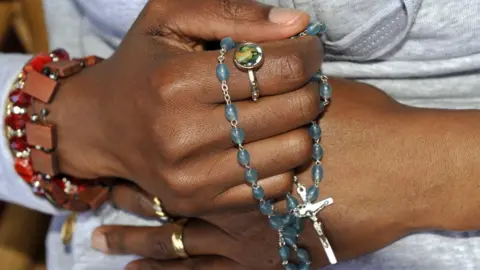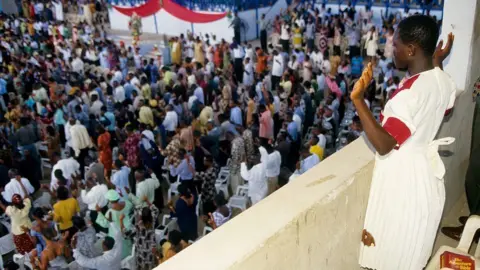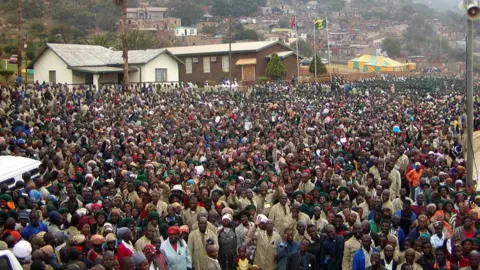Coronavirus: Why Ghana has gone into mourning after mass funeral ban
 Getty Images
Getty ImagesIn our series of letters from African writers, journalist and former Ghana government minister Elizabeth Ohene writes about the dramatic impact coronavirus is having on life in her country and beyond.
If anyone had any doubt about just how serious the Covid-19 outbreak is, we now have proof positive, we are in the midst of a huge crisis.
This is a crisis not measured yet by how many people have been taken ill, or are in hospital or have died.
Here in Ghana, there are some things that are sacred in our lives and nobody touches them under any circumstance: religion, handshakes and funerals.
These are subjects that are not up for discussion and many people believe they define our very existence.
 Getty Images
Getty ImagesFor weeks, government and health officials here have been warning everybody to improve personal hygiene and avoid crowds.
Many people preferred to think that the coronavirus would not make it into sub-Saharan Africa and therefore they believed the warnings by the health experts could be ignored.
'Only enemies refuse to shake hands'
Whoever heard of a Ghanaian, indeed, an African greeting another person and not shaking hands?
To refuse or ignore to shake hands with someone means that person is an enemy. Now we can't shake hands with anybody, friend or foe.
President Nana Akufo-Addo set the tone for the new rules at the celebrations of Ghana's 63rd independence anniversary on 6 March, when he ostentatiously kept both his hands resolutely behind his back when he arrived at the ceremony to greet those seated on the dais.
And as though the prohibition on handshaking was not traumatic enough, a ban has been put on the holding of funerals. The official announcement says there can be private burials, but no mass gatherings of mourners.

I am not sure I can convey the enormity of this on the Ghanaian psyche.
There is no such thing as a private burial in our thinking and funerals are huge, dramatic and regular ceremonies.
Our lives revolve around funerals.
The catering industry relies on funerals to survive, the textile industry needs orders for funeral cloths to stay in business, the tailors and dressmakers are busy mostly because they make clothes for funerals; choral groups, events organisers, transportation and manufacturers and sellers of alcoholic and non-alcoholic drinks would disappear without funerals.
But there will be no more funerals.
Come to think of it, what with the hand shaking ban, it's probably just as well that a ban has been placed on funerals.
We can't have funerals and not shake hands, the entire funeral ceremony consists of shaking hands, shaking hands and shaking hands.

- LIVE: Latest updates on the coronavirus outbreak
- A SIMPLE GUIDE: What are the symptoms?
- AVOIDING CONTACT: Should I self-isolate?
- STRESS: How to protect your mental health
- MAPS AND CHARTS: Visual guide to the outbreak

The ban on religious gatherings here, and in some countries elsewhere on the continent, is having a big impact on people for whom communal prayer and the discipline of the religious calendar are central to their lives.
But there is silence in the mosques and in the churches here in Ghana.
When the announcement was first made by the president, the Christian leaders were stunned and the charismatic churches in particular were in total disbelief.
Miracle prayers
It was unthinkable that anything or anybody could close church services. The all-night services, the miracle services, the anointing services have taken over all our lives.
Some had hoped that the promise of miracle prayers to save Ghana from the scourge of coronavirus would convince the president to keep the churches and mosques open, but he was not moved to change his mind.
And they will stay closed throughout Easter, the most sacred festival on the Christian calendar.
 Getty Images
Getty ImagesThe order to close the churches is turning out to be the most difficult one for people to obey.
The mainstream churches are complying and many are offering online services, which include provisions for offertory to be made through mobile money donations.
But some of the charismatic churches seem to think they are allowed to flout the order not to hold church services by claiming they are offering special prayers against Covid-19.

You may also be interested in:

Going to church multiple times a week is normal for many people and the news is usually full of the antics of some of the so-called men of God.
The president asked the nation to fast and pray on Wednesday this week and doubtless, some people would have had difficulty accepting that they could fast and pray by themselves at home without going to church.
From here, we keenly follow all the news about how the rest of the continent is doing with the role of religion in the march of the deadly coronavirus.

I have no doubt that the approach of Tanzanian President John Magufuli would be cited by some people here as worth following.
He has banned public gatherings and closed schools as we have, but he said he did not ban church or mosque worship because these were places where "true healing" took place.
"Coronavirus is a devil, it can not live in the body of Christ, it will burn instantly. This is a time to build our faith," President Magufuli, who has a PhD in chemistry and is a devout Catholic, said at a church service last Sunday.
President Akufo-Addo has urged us to seek the face of God and pray for Ghana but he is sticking to the science and emphasising the washing of hands, social distancing and the churches and mosques remain closed.
 Getty Images
Getty ImagesIt is now getting through to many people that we are in deadly uncharted territory when the Zion Christian Church (ZCC), probably the biggest church in southern Africa, announced it had postponed all gatherings including their Easter service.
This service normally draws millions of pilgrims, who congregate at the foothills of the Moria Mountain in Limpopo during the Easter weekend, and there surely cannot be a more dramatic spectacle.
Never, in the history of the ZCC, since its inception in 1910, has the church postponed or cancelled its pilgrimage.
We can't shake hands, we can't have funerals, we can't go to worship at the mosque or the church, the ZCC has postponed its Easter pilgrimage; we are in the midst of an emergency alright.

More Letters from Africa
Follow us on Twitter @BBCAfrica, on Facebook at BBC Africa or on Instagram at bbcafrica

